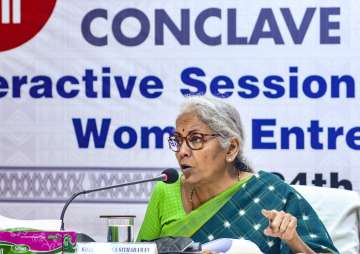Sithraman on inflation: With inflation easing from a record high, Finance Minister Nirmala Sitharaman on Wednesday said it is no longer "red-lettered" and the priority for the government now is job creation and boosting growth. Besides, equitable distribution of wealth remains the other focus area, she said at the India Ideas Summit here.
"Some of course are red-lettered (priorities), some may not be. Red-lettered ones would of course be jobs, equitable wealth distribution and making sure India is moving on the path of growth.
"In that sense inflation is not red-lettered. I hope it doesn’t surprise many of you. We have shown that in the past couple of months that we were able to bring it to a manageable level," she said at the event.
Retail inflation touched a high of 7.79 per cent in April this year since then it is on a downward trajectory. According to official data, retail inflation softened to 6.71 per cent in July due to moderation in food prices but remained above the Reserve Bank's comfort level of 6 per cent for the seventh consecutive month. The Consumer Price Index-based retail inflation was at 7.01 per cent in June.
She exuded confidence that the Reserve Bank would manage the volatility emerging from the aggressive rate hike stance by the US Fed and the European Central Bank.
"In spite of all challenges...we are confident that irrespective of steps central banks around the world would take to protect their economy..., we are confident that the steps that US Fed may take or ECB, RBI is fairly clued into the developments happening all around and they are confident of handling Indian monetary policy without major blips or rise and falls," she said. Last month, Federal Reserve Chairman Jerome Powell hinted at more aggressive rate hikes to fix inflation which is at a record high.
In July, Fed effected its second consecutive rate hike of 75 basis points. The Fed’s move raised its key rate, which affects many consumer and business loans, to a range of 2.25-2.5 per cent, its highest level since 2018.
Even the ECB is expected to frontload rate hike at the cost of growth of the region due to the rising cost of living which is threatening to surge even higher. On the fiscal management during the COVID-19 period, she said, India with a targeted fiscal policy managed through a challenging time without printing money.
Referring to the global energy crisis triggered by the ongoing Russia-Ukraine war, she said, uncertainty over the availability of crude, and natural gas continues. She also underlined the need for deepening of ties between India and the US in all respects including payment technology. India stack is making a very big buzz around the financial domain and payment space and also heard some talking if India stack can become a global stack, she said.
"If India and US together had to work, I guess we will reach a 30 per cent of global economy size and we will be contributing 30 per cent of global GDP within next 20 years. That itself will make India and US engine of the global growth," she said. On data privacy and protection, she said, India will introduce a new data privacy bill "sooner than later".
"IT Minister Ashwini Vaishnaw has assured we will soon have a new Data Privacy Bill, which will be a product of consultations and will address every such concern most of us had on the Privacy Bill".
Last month, the Centre withdrew the long-awaited Personal Data Protection (PDP) Bill, 2019, to replace it with a new bill with a ‘comprehensive framework’ and ‘contemporary digital privacy laws.
On New Delhi taking over the G20 Presidency later this year, she said India will be taking over the G20 chair at a very challenging time.
"It is the right time to focus on the emerging economies, and address issues of global concern through these economies. Emerging economies are going to be the centre of focus," she added.
India will hold the Presidency of the G20 from December 1 to November 30, 2023. India will host the G20 summit next year.
Also Read: Escalation of geopolitical tensions biggest risk to India's growth outlook: Jayanth Varma
Latest Business News
